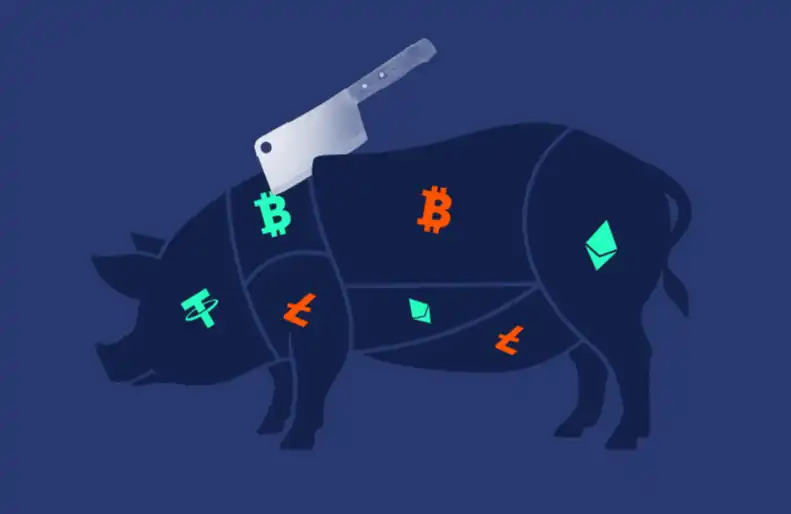Ceramic: middleware built for Web3.0 social applications
The original title: "IOSG Weekly Brief | Ceramic - creating Web3.0 social application middleware # 110"
原文来源: IOSG
Part.1 Insight
Author: Chloe, & have spent IOSG Associate
This article is for the purpose of industry learning and exchange only, and does not constitute any investment advice
Storage protocols for the "seed seeking" era: BitTorrent
Speaking of BitTorrent, many people will find it strange. But when it comes to downloading "seeds," the term used to describe BitTorrent downloads, many of you will recall the days a few years ago when you were scouring the Internet for "seeds" to play games or watch movies. A seed file is an index file that records the location, size, address of the download server, and address of the publisher of the downloaded file.
To put it simply, BitTorrent is a peer-to-peer (P2P) download protocol that is far more efficient than traditional downloads from web servers. To give a vivid example, in school, the class gets together to copy an assignment, but only one student writes the assignment, and all the other students have to copy the answers. Each student copy homework speed is not the same, once more people want to copy homework, this process is difficult to carry out. So the common practice is that some students copy multiple choice questions, some students copy fill-in-the-blank questions, some students copy essay questions, and then we change to copy, the efficiency of a go up.
BitTorrent works like a copycat. Each user downloads only a portion of the file, and at the same time, our computer acts as a server to transfer that portion of the file to other users. This means that as we download, we are also uploading (what others have downloaded from our computers), so we are contributing by enjoying the download provided by others, so the more users download the file, the more seeds, and the faster the synchronization, the faster the download.
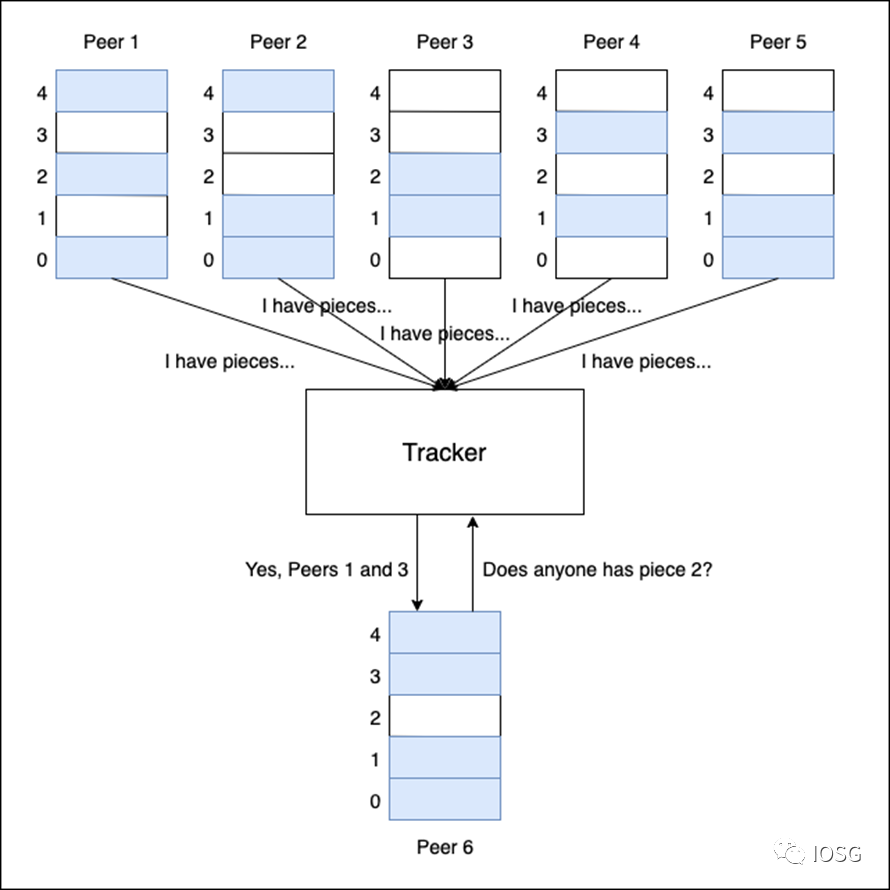
(Image: IOSG Ventures)
Pioneers of decentralized storage: IPFS
Despite the improvements, BitTorrent still has some problems, and to optimize these problems, IPFS has to be mentioned. I'm sure many readers are more familiar with IPFS, which is the basis for some of the most well-known decentralized storage projects such as Arweave and Filecoin. IPFS, which translates to interplanetary File System in Chinese, is a network transport protocol for distributed storage and file sharing.
BitTorrent downloads require the use of a seed file, and users need to put the location of all the downloaded content in the seed file to download. One of the significant advantages of IPFS is the use of a DAG data structure to store data. The advantage of this data structure is that IPFS stores and finds files in a content-based rather than address-based manner.
This means that if we're looking for a file, we don't need to know where it is, just what it contains. IPFS will be generated for each file a unique hash value (for example QmSNssW5a9S3KVRCYMemjsTByrNNrtXFnxNYLfmDr9Vaan), when the user needs to retrieve the file, you just need to ask IPFS who has this hash (QmS... Vaan) can complete the retrieval. Because hashes prevent duplicate storage, files with the same contents will not be duplicated by IPFS. This optimizes storage and improves network performance.
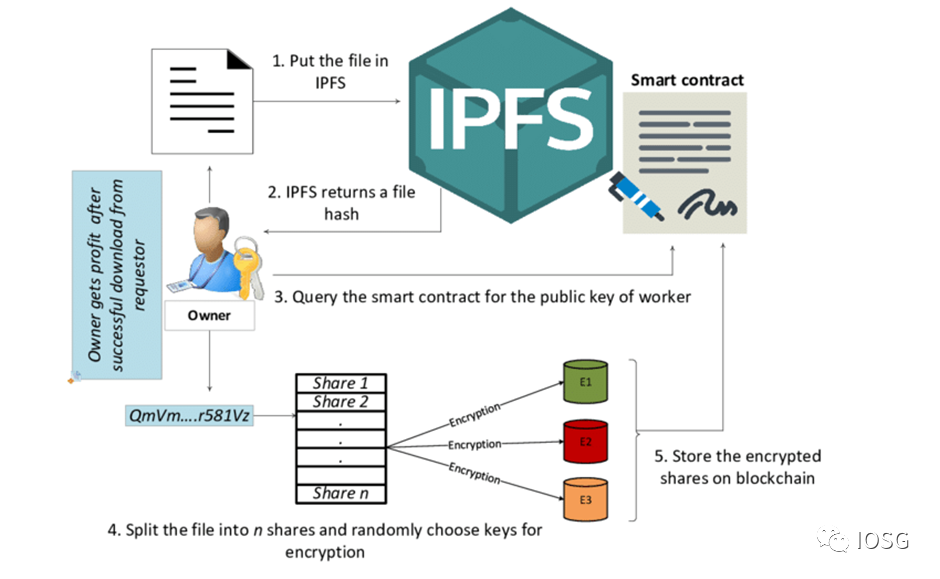
(Photo: Researchgate.net)
Dynamic storage solutions: Ceramic
From the above description, a careful reader may find that IPFS has a huge flaw. In IPFS, once a file is stored, it cannot be modified in the system because changing the file contents changes the hash value of the file, and the user cannot find the changed file through the original hash value.
This is a sore point with IPFS: it's not good at storing files that need to be updated. Therefore, there is an urgent need for an efficient and decentralized solution to store dynamic data. Thankfully, exploration of the track has already begun. Those of you who follow Web 3.0, SocialFi, or DID have heard of this project, Ceramic. Ceramic is a decentralized, open source platform for creating, hosting, and sharing data, and several DID and Social Graphs have been built on it. As mentioned earlier, IPFS does a good job of storing static files, but it lacks the computing and state management capabilities of its own to implement more advanced database-like features such as variability, version control, access control, and programmable logic. The emergence of Cermaic has solved the above problems to a certain extent.
Efficient version control
In Ceramic, each piece of stored information is represented as a superimposed log, called a Stream. Stream is similar to Git in concept. Git is an open source distributed version control system, which can effectively and quickly handle large and small project version management. It is the most popular version control software at present. It can be used to store code, track revision history, merge code changes, restore to earlier code versions and so on.
Git processes data like a "snapshot," a bit like sharing documents with Google Docs and viewing historical versions. Every time you submit an update or save the data state, it creates a snapshot of all the files at that time and saves the index of that snapshot. If the file has not been modified, Git does not re-store the file, but keeps only a link to the previously stored file, greatly increasing efficiency.

(Image: IOSG Ventures)
In fact, you can use Git to store dynamic data on IPFS as well. However, you need to create a hash-log file in Git to record the mapping table of every Git log and IPFS hash update, and you need to keep the synchronization dynamic manually, or use the IPNS naming system to keep the update dynamic. This operation is time-consuming and laborious, and the efficiency is very low.
Ceramic uses a "superimposed log" approach, and StreamID does not change in response to content changes, so it is very easy to store modified versions or go back to previous versions without constantly changing the hash value. Furthermore, Ceramic creates a new layer on top of other storage protocols, meaning that it is highly composable. Users can choose where to store their data, including decentralized Arweave, Filecoin, and centralized AWS, all of which can use Ceramic for automated version control. And because each Stream only stores logs and not data, Ceramic does not need a global ledger to synchronize data state globally, so Ceramic's horizontal scalability is very high.
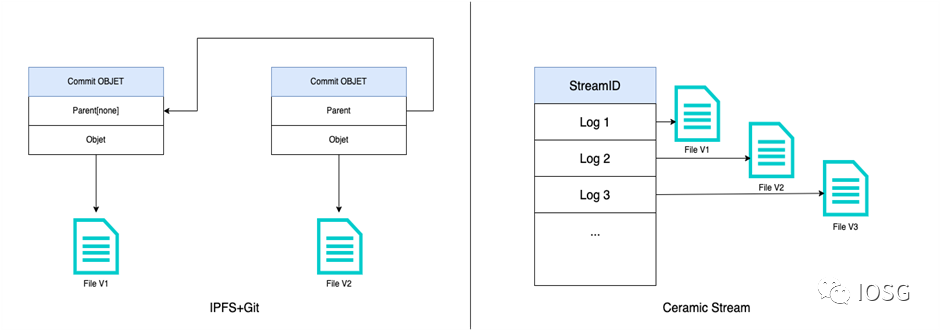
(Image: IOSG Ventures)
Easy authentication and access control
In addition to the benefits of version control, Ceramic provides very convenient authentication and access control. When new data is to be added to the Stream, the modifier needs to authenticate, otherwise the data cannot be modified. Different streams can require different authentication mechanisms, and Ceramic provides a very powerful built-in authentication mechanism -- DID.
For example, 3ID diDs suitable for end users, key diDs suitable for developers, NFT diDs supporting authentication with NFT and Safe diDs suitable for DAO and other Safe diDs requiring multiple authentication ensure data security. At the same time, Ceramic gives the Stream programmable logic, such as Stream B can be accessed and upgraded if Stream A changes state. The appearance of Ceramic has greatly empowered the construction of Web 3.0. There have been many DID and Web3.0 social platform projects developed on Ceramic. Look out for CyberConnect, The Social Graph Middleware platform, Orbis for Web3.0 Twitter, The Convo Space, and more.
We look forward to the new possibilities that Ceramic infrastructure can bring to the application layer.
Part.2 Investment and financing events
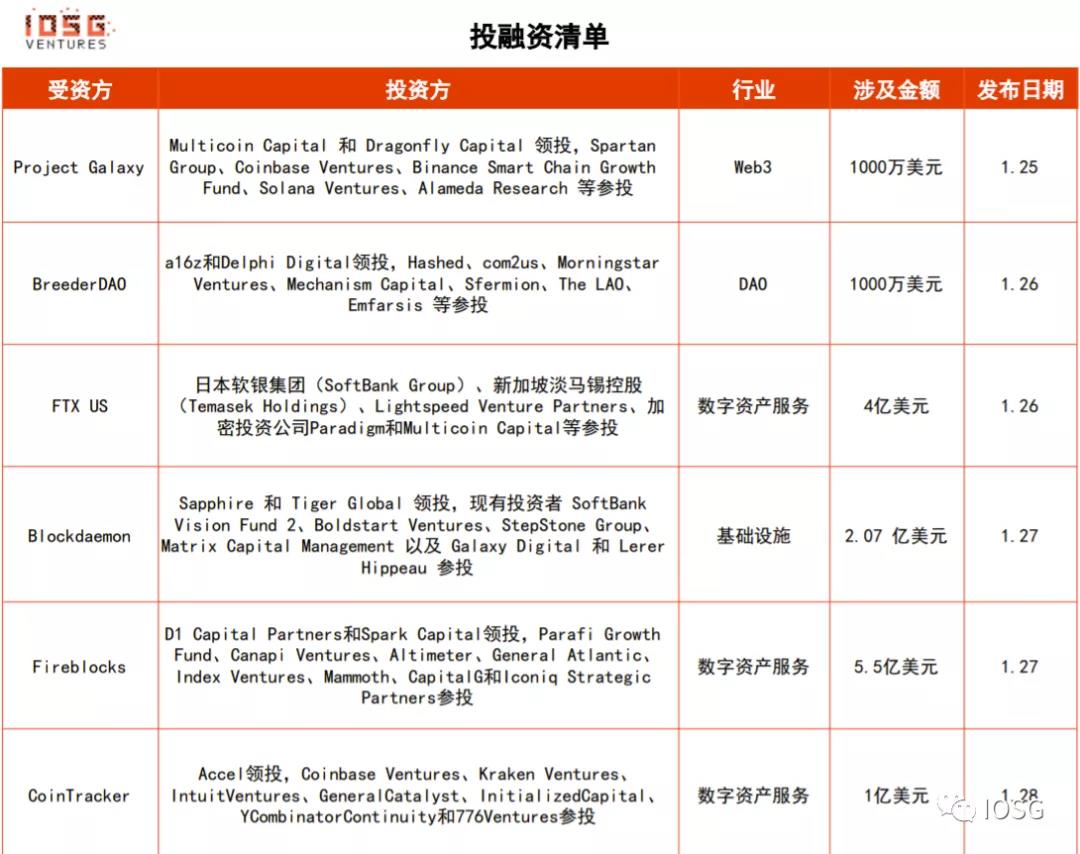
Project Galaxy has raised $10m, led by Multicoin Capital and Dragonfly Capital
*Web3
Web3 certified data network Project Galaxy has announced a $10 million funding round led by Multicoin Capital and Dragonfly Capital, Spartan Group, Coinbase Ventures, Binance Smart Chain Growth Fund, Solana Ventures, Alameda Research and many Web3 industry leaders participated. The new funding will be used to develop certification data networks, expand support for multiple data sources, and build powerful application modules to help projects leverage digital certification data more effectively.
BreederDAO closed $10 million Series A round, led by A16Z and Delphi Digital
*DAO
BreederDAO announced that it closed A $10 million Series A round, led by A16Z and Delphi Digital, Hashed, COM2us, Morningstar Ventures, Mechanism Capital, Sfermion, The LAO, Emfarsis and others contributed. BreederDAO will use the funds to expand its asset production program. BreederDAO will also make strategic investments in blockchain games that adopt a player-driven economic model. In these games, a lot of good assets are needed to meet rising consumer demand from the time of the game's launch. BreederDAO will also expand its core team, hiring engineering and business veterans.
FTX US raised $400 million in Series A financing at A valuation of $8 billion, with SoftBank and Temasek participating
*CEX
Cryptocurrency exchange FTX US said on Wednesday it raised $400 million in series A funding, valuing the company at $8 billion. SoftBank Group of Japan, Singapore's Temasek Holdings, Lightspeed Venture Partners, Crypto investment firm Paradigm and Multicoin Capital are among the investors.
Blockdaemon closed a $207 million Series C round at a $3.25 billion valuation, led by Sapphire and Tiger Global
* Infrastructure
Institutional blockchain infrastructure company Blockdaemon announced on Wednesday that it closed a $207 million Series C round led by Sapphire and Tiger Global at a post-funding valuation of $3.25 billion, Existing investors SoftBank Vision Fund 2, Boldstart Ventures, StepStone Group, Matrix Capital Management, Galaxy Digital and Lerer Hippeau for refs. The company also announced a partnership with Stakeholder Wise to increase liquidity pledging capabilities and announced the launch of its own DeFi Fund to expand its reach in the crypto ecosystem.
Fireblocks has raised $550 million in Series E funding at a valuation of $8 billion
* Crypto asset management
Digital asset hosting platform Fireblocks has raised $550 million in Series E funding at a valuation of $8 billion. The round was led by D1 Capital Partners and Spark Capital, Parafi Growth Fund, Canapi Ventures, Altimeter, General Atlantic, Index Ventures, Mammoth, CapitalG and Iconiq Strategic Partners for refs. Fireblocks now serves more than 800 institutional clients, These include Bank of New York Mellon, Revolut, Galaxy Digital, Crypto.com, BlockFi, SwissBorg, CoinShares, eToro and Three Arrows Capital.
CoinTracker has raised $100 million in Series A funding at A valuation of $1.3 billion
* Encrypted tax services
CoinTracker announced the closing of A $100 million Series A funding round led by Accel. Coinbase Ventures, Kraken Ventures, IntuitVentures, GeneralCatalyst, InitializedCapital, YCombinatorContinuity and 776Ventures For refs. In addition, Coinbase board member Gokul Rajaram, former Stripe CEO Claire Hughes Johnson, Snapchat investor JeremyLiew, and Deel CEO Alex Bouaziz Many angel investors also participated in this round of financing. The new funds will be used to expand the team, enhance the platform's capabilities, partner with more cryptocurrency trading platforms and expand globally.
Footprint Analytics closed a $1.5 million seed round led by IOSG Ventures
* Crypto analysis platform
FootprintAnalytics, a blockchain data analytics platform, raised $1.5 million in seed funding, led by IOSG Ventures and joined by NGC, Arkstream, Youbi, SevenX Ventures and Puzzle. This round will be used to strengthen marketing and add more public links and protocol analytics.
Astar Network completes $22 million strategic round of financing
*dApp
Astar Network, a dApp platform in Boca Ecosystem, has completed a $22 million strategic round of funding, Participants include Polychain Capital, Alameda, Research, Alchemy Ventures, Animal Ventures, Crypto.com Capital, Digital Finance Group, GSR, Vessel, Injective Protocol, Scytale Ventures, Polkadot founder Gavin Wood, Quantstamp founder Richard Ma, Japanese soccer star Keisuke Honda and Web3 Core member of Foundation and Parity Technologies. Astar Network is the dApp hub in the Boca ecosystem, supporting Ethereum, Web Assembly and Tier 2 solutions.
FTX completed a $400 million SERIES C financing at a valuation of $32 billion, with SoftBank and Paradigm participating in the financing
*CEX
FTX Trading Ltd. announced a $400 million Series C funding round valued at $32 billion, Participants in the round included SoftBank, Paradigm, Tiger Global and the Ontario Teachers' Pension Plan Board. The announcement comes less than four months after FTX's last fundraising, which valued the company at $25bn.
Stader Labs has raised $12.5 million in private funding at a valuation of $450 million
*GameFi
Galaxy Fight Club, the first cross-IP, multi-platform player fighting game platform, has announced that it has raised $7 million in seed and private funding. Animoca Brands, Sequoia Capital India and Skyvision Capital led the round. Other participants include The Chernin Group, YGG SEA, Spartan Capital, Sfermion, PKO Investments, Infinity Ventures Crypto, and Huobi Innovation Labs, Kucoin Labs, Rarestone Capital, Formless Capital, Gerstenbrot Capital, and many other prominent angel investors, Including Kevin Lin of Twitch, Kun Gao of Crunchyroll, and Matt Finick of ROBLOX and Marvel studios.
Dune Analytics closed a $69.42 million Series B funding round at a $1 billion valuation
* Crypto analysis platform
Dune Analytics, a blockchain Analytics firm based in Oslo, Norway, has officially joined the crypto unicorn club, announcing that it has completed a $69,420,000 Series B funding round at a valuation of $1 billion. Coatue led the round, which included previous investors such as Multicoin Capital and Dragonfly Capital.
Trust Machines has raised $150 million to build a Bitcoin application ecosystem
* Infrastructure & NBSP;
Trust Machines announced that it closed a $150 million funding round, It is funded by Breyer Capital, Digital Currency Group, GoldenTree, Hivemind and Union Square Ventures.
Qredo raised $80 million in Series A funding at A valuation of $460 million
* Infrastructure
Crypto infrastructure developer Qredo has raised $80 million in Series A funding at A valuation of $460 million. Led by hedge fund giant Dan Tapiero's 10T Holdings, Coinbase Ventures, Avalanche, Terra, Kingsway Capital, HOF Capital, Raptor Group, GoldenTree Asset Management, etc. The new funds will be used to drive growth through acquisitions, product development and geographical expansion.
Part.3 Project progress after IOSG investment
Machina, NEAR's first shard data storage project online
* male chain & have spent
NEAR has announced the launch of its first shard data storage project, Machina. Machina was created by the development team in collaboration with NEAR, Aurora, and the online security protocol HAPI, using NEAR's Nightshade technology to extend stored data to support EVM-compatible protocols such as Aurora. Machina will use file-based storage to store each transaction directly into it, eliminating the elapsed time needed to trigger data retrieval or upload.
Avalanche will hold its first Asian hackathon with more than $5 million in prize money
* male chain & have spent
Avalanche Agreement announced that the first Asian hackathon will be officially launched on February 1st, and the prize pool will be provided by AVATAR (Avalanche Asia Star Fund), Blizzard Fund and more than 20 organizations from the upstream and downstream of the industry. More than $5 million in total. At the same time, some sponsors and organizations such as Avalaunch, Colony and BenQi will serve as the judging support.
Debank launches Web3 social platform
*DeFi
One-stop DeFi wallet Debank launches Web3 social platform, users can use this platform to follow the news of Orca trading, NFT market trends, Mirro articles updates and Web3 friends real-time chain activities.
Celer's Cross-chain payment network cBridge announces Support for Convergence Finance (CONV)
* across the chain
CBridge, a cross-chain payment Network launched by Celer Network, has announced its support for Convergence Finance (CONV), a decentralized interchangeable asset protocol that will work together to establish open native asset standards for multi-chain scaling. Users can now use cBridge to bridge CONV between Ethereum and Moonbeam at high speed and low cost across the chain. In addition, Celer said it will soon launch a liquidity incentive campaign on Moonbeam.
Emulsion wins Polkadot 8th parallel chain slot Auction
* boca
Auction's candle period has ended on January 27. After decentralized asset financing agreement, Centrifuge locks 5,435,100 DOT to win the 8th parallel chain slot Auction of Polkadot. The ninth auction will open at 3am on February 4, 2022. HydraDX currently leads all active Crowdloan campaigns in the number of locked DOT counts.
Part.4 Industry pulse
The founding team of Etherscan has released a beta version of its instant Chat tool Blockscan Chat
*SocialFi
Blockscan, the team that created the Etherscan blockchain browser, has released a beta version of its Ethereum address-based instant Chat tool, Blockscan Chat. Blockscan Chat is a messaging platform that allows users to easily and instantly send messages to each other from wallet to wallet, according to a disclosure on the site's homepage.
PeckShield: Qubit, a decentralized lending program, was hacked, costing about $80 million
*DeFi
PeckShield, a security agency, tweeted that Qubit, a lending product owned by QBridge, BSC's eco-decentralized lending program, was suspected to have been hacked, with hackers minting large amounts of xETH collateral and consuming about $80 million of assets in the capital pool.
Axie Infinity founder launches Ronin Network's governance Token RON
*GameFi
玩赚(P2E)游戏 Axie Infinity 创建者 Sky Mavis 正在推出 RON Token,这是其以太坊侧链 Ronin Network 的治理 Token 。RON Token 使用户能够为 Ronin 链上的交易付费,还拥有去中心化金融 (DeFi) 功能,包括社区治理、质押奖励等。根据 CoinMarketCap 的数据,RON 当前的交易价格约为 3.75 美元。
Luxury car maker Ferrari has launched a digital services division, making a formal foray into the metasverse
*Metaverse
Benedetto Vigna, CEO of luxury car maker Ferrari, said the company has set up a division focused on digital services to explore potential opportunities in the metasomes that combine virtual reality, gaming and social to enhance its brand in virtual worlds. Benedetto Vigna says it will also explore areas such as NFT and is in the process of establishing new technology partnerships.
Fed Chairman Powell: Rate hike in March, assuming conditions are right
* regulation
The Fed's FOMC statement on Wednesday said it would raise rates "soon". "I would say that the Committee intends to raise the federal funds rate at its March meeting, provided conditions are right," he told reporters on a specific timetable for rate increases. But he points out that the fed has not yet to make a decision, in March is still a long way to go, the economic situation may change, he said: "we cannot confidently predict policy interest rate path whether appropriate, so now we have no policy path to make any decisions, I once again, we will remain modest and flexible".
Mr Putin supports the approval of regulated crypto mining
* regulation
President Vladimir Putin has backed a proposal by the Russian government to approve regulated crypto mining. Putin has previously said that Russia has some advantages in cryptocurrency mining. He also asked the Finance Ministry and the Russian Central Bank to agree on cryptocurrency regulation.
In 2021, Meta will lose about $10 billion in its metasexe-related business
*Metaverse
Meta (formerly Facebook) reported a net loss of approximately $10.2 billion for its Reality Labs unit in 2021, according to the company's fourth-quarter 2021 earnings report, which was also the first disclosure of the Reality Labs unit's financials. Reality Labs lost about $4.5 billion in 2019 and $6.6 billion in 2020, according to company earnings reports. Losses in the Meta-universe business are a drag on the profitability of the company as a whole, and without Reality Labs' losses, Meta's profit in 2021 was more than $50 billion.
The original link
Welcome to join the official BlockBeats community:
Telegram Subscription Group: https://t.me/theblockbeats
Telegram Discussion Group: https://t.me/BlockBeats_App
Official Twitter Account: https://twitter.com/BlockBeatsAsia


 Forum
Forum Finance
Finance
 Specials
Specials
 On-chain Eco
On-chain Eco
 Entry
Entry
 Podcasts
Podcasts
 Activities
Activities
 OPRR
OPRR




